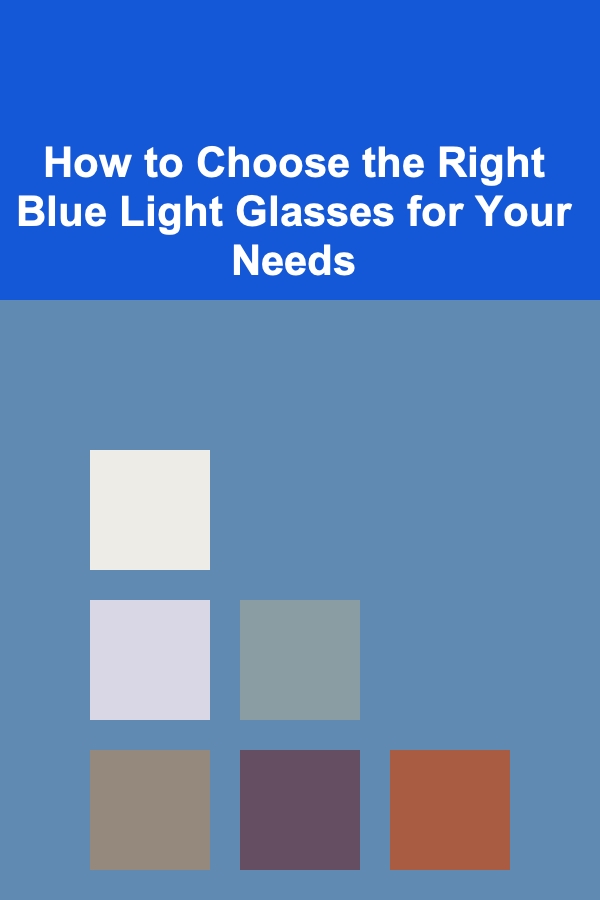
How to Choose the Right Blue Light Glasses for Your Needs
ebook include PDF & Audio bundle (Micro Guide)
$12.99$7.99
Limited Time Offer! Order within the next:

In today's digital age, many people spend hours each day staring at screens---whether it's for work, entertainment, or communication. Prolonged exposure to blue light emitted by devices like smartphones, computers, and televisions can strain the eyes and negatively impact sleep patterns. As a result, the demand for blue light glasses has surged in recent years. These specialized glasses promise to reduce blue light exposure and protect the eyes from potential harm. But with a growing market filled with a wide range of options, how can you choose the right pair for your needs?
This article will explore everything you need to know about blue light glasses---from their benefits and features to how to select the perfect pair based on your lifestyle and needs.
Understanding Blue Light and Its Effects
Blue light is a high-energy visible (HEV) light that is emitted by digital screens, as well as natural sources like sunlight. While blue light is an essential part of the light spectrum and helps regulate our circadian rhythm (sleep-wake cycle), excessive exposure, particularly from artificial sources, can cause various eye-related problems.
Digital Eye Strain
The most common effect of prolonged screen use is digital eye strain, which manifests as dryness, blurred vision, headaches, and neck or shoulder pain. Staring at a screen for long periods can cause the eyes to lose their natural focus, resulting in discomfort and fatigue.
Sleep Disruption
Another major concern with blue light exposure is its impact on sleep patterns. Blue light interferes with the production of melatonin, a hormone responsible for regulating sleep. Studies have shown that exposure to blue light in the evening can delay sleep onset, reduce sleep quality, and contribute to insomnia.
Long-Term Eye Health
There is growing evidence suggesting that long-term exposure to blue light could contribute to retinal damage and increase the risk of macular degeneration, a condition that affects the central vision.
The Role of Blue Light Glasses
Blue light glasses are designed to block or filter out a significant portion of the blue light emitted by digital screens. By wearing these glasses, users can reduce digital eye strain and improve sleep quality by limiting their exposure to disruptive blue light.
How Blue Light Glasses Work
Most blue light glasses feature a special coating or lens material that absorbs or reflects blue light. These lenses are often yellow-tinted or clear, depending on the level of blue light they are designed to block. Some glasses even offer a coating that reduces glare, further enhancing the visual experience.
While wearing blue light glasses does not fully eliminate the risks associated with excessive screen time, they can help mitigate the symptoms of digital eye strain and promote better sleep hygiene.
Benefits of Blue Light Glasses
Understanding the benefits of blue light glasses will help you make an informed decision when selecting the right pair. Below are the primary advantages:
3.1. Reduction in Digital Eye Strain
The most immediate benefit of blue light glasses is the reduction in digital eye strain. These glasses can reduce discomfort from prolonged screen time, such as headaches, dry eyes, and blurred vision. By filtering blue light, the glasses help prevent overexposure to high-energy light, allowing the eyes to focus more naturally.
3.2. Improved Sleep Quality
If you often use digital devices late at night, blue light glasses can help maintain your sleep quality. By blocking blue light, these glasses can promote the production of melatonin, making it easier to fall asleep and improving overall sleep quality. This can be especially important for individuals who struggle with sleep disturbances related to screen use.
3.3. Prevention of Long-Term Eye Damage
While research on the long-term effects of blue light exposure is ongoing, many experts believe that blocking blue light can help prevent potential retinal damage. This could reduce the risk of conditions like macular degeneration in the future, especially as more people spend hours looking at screens.
3.4. Less Eye Fatigue
If you frequently suffer from eye fatigue after long hours of screen use, blue light glasses can help. These glasses can help your eyes relax and focus more easily, reducing the overall strain and making it easier to work or enjoy entertainment for longer periods.
What to Look for When Choosing Blue Light Glasses
With so many blue light glasses on the market, selecting the right pair can be challenging. Here are several factors to consider when making your decision:
4.1. Level of Blue Light Protection
Not all blue light glasses offer the same level of protection. Some glasses block only a small percentage of blue light, while others block up to 100%. The right pair for you depends on your needs and the amount of time you spend in front of screens.
- Moderate Blockers (30-50%): These are ideal for people who spend a few hours each day in front of screens. They will provide relief from digital eye strain but are not as intense as higher block percentages.
- High Blockers (70-100%): These glasses are best for individuals who spend extended hours in front of screens, such as those working in front of a computer all day or using devices in the evening.
4.2. Lens Type and Tint
Blue light glasses come in different types of lenses, which can affect the overall visual experience.
- Yellow-Tinted Lenses: These lenses block a high percentage of blue light and can enhance contrast, making them ideal for night-time screen use. They may, however, alter the color accuracy of your screen.
- Clear Lenses: These lenses filter a smaller amount of blue light but offer a more natural view with minimal color distortion. They are a good option for daytime use when you don't want your color perception to be affected.
- Anti-Reflective Coating: Some blue light glasses come with an anti-reflective coating that reduces glare, providing an even more comfortable viewing experience.
4.3. Fit and Comfort
Like any pair of glasses, the fit is crucial for comfort. Look for glasses that suit the shape of your face and are adjustable to ensure they don't cause discomfort over extended periods of wear. Some brands offer a variety of frame sizes to suit different face shapes, so try on a few options to find the best fit.
- Adjustable Nose Pads: These can help ensure the glasses don't slide down your nose or cause pressure on your temples.
- Lightweight Frames: Glasses with lightweight frames are ideal for extended wear, as they won't cause discomfort or headaches.
4.4. Style
Blue light glasses are available in a variety of styles, from sleek and modern to classic and vintage-inspired. Choose a style that reflects your personality and makes you feel confident. After all, you'll be wearing them every day, so it's essential that you like how they look.
- Modern and Minimalist Frames: These are often thin and contemporary, offering a stylish look for those who prefer something subtle.
- Bold, Statement Frames: If you prefer a more noticeable look, consider bold, oversized frames that make a fashion statement.
- Classic Frames: These timeless designs, such as round or square frames, are perfect for those who want something versatile.
4.5. Durability and Quality
Since blue light glasses are a long-term investment, it's important to choose a pair that is durable and of high quality. Look for glasses made from sturdy materials like stainless steel or acetate. Additionally, check for warranties or return policies to ensure you can exchange or return the glasses if they don't meet your expectations.
When to Wear Blue Light Glasses
While blue light glasses can offer substantial benefits, knowing when to wear them is key to maximizing their effectiveness.
5.1. During Screen Time
The most obvious time to wear blue light glasses is when you are using digital devices. Whether you're working on a computer, watching TV, or scrolling through your phone, wearing blue light glasses can reduce digital eye strain and make it more comfortable to focus.
5.2. Before Bed
For those who struggle with falling asleep due to screen use, wearing blue light glasses in the evening---especially an hour or two before bedtime---can help reduce the disruption to your circadian rhythm. This is especially effective if you frequently check your phone or watch television late at night.
5.3. Throughout the Day
If your work involves extended screen time, wearing blue light glasses throughout the day can prevent eye fatigue and discomfort. This is particularly useful for individuals who spend most of their working hours in front of a computer or mobile device.
How to Take Care of Your Blue Light Glasses
To ensure your blue light glasses last as long as possible and continue to provide optimal protection, proper care is essential.
- Clean Regularly: Use a microfiber cloth to clean your lenses regularly and avoid scratching the surface. You can also use a lens cleaning solution for deeper cleaning.
- Store in a Case: Keep your glasses in a hard case when not in use to protect them from damage. This will prevent scratches and extend their lifespan.
- Check for Damage: Inspect your glasses periodically for any signs of wear, such as cracks or loose hinges, and have them repaired or replaced if necessary.
Conclusion
Blue light glasses can significantly enhance your digital lifestyle by reducing eye strain, improving sleep quality, and potentially protecting your long-term eye health. However, choosing the right pair involves more than just picking the first pair you see. Consider the level of protection you need, the lens type and tint that works best for your lifestyle, and the fit and style of the glasses. By making informed choices based on your specific needs, you can enjoy the benefits of blue light glasses while safeguarding your eyes in the digital age.
Reading More From Our Other Websites
- [Personal Care Tips 101] How to Choose Between Chemical Exfoliation and Physical Scrubs
- [Home Holiday Decoration 101] How to Create Cozy Holiday Bedding for a Perfect Winter Night
- [Organization Tip 101] How to Maximize Space with Hanging Utensil Racks
- [Personal Care Tips 101] How to Apply Lip Gloss for a Soft, Dewy Finish
- [Home Storage Solution 101] How to Create a Clutter-Free Kitchen with Smart Storage Solutions
- [Personal Investment 101] How to Integrate High-Yield Savings Accounts into Your Overall Investment Plan
- [Home Budget Decorating 101] How to Create a Functional and Beautiful Entryway on a Budget
- [Scrapbooking Tip 101] DIY Scrapbooking Embellishments: Craft Your Own Unique Touches
- [Personal Care Tips 101] How to Use a Face Mask for Skin Brightening and Revitalization
- [Needle Felting Tip 101] Essential Accessories for Advanced Needle Felting Projects: From Frames to Brushes

How to Create a Cleaning Schedule for Your Appliances
Read More
How to Create a Pantry Inventory Checklist for Grocery Shopping
Read More
How to Organize Scrapbooking Supplies for Quick Creation
Read More
The Customer Success Manager's Toolkit: Proven Methods for Maximizing Customer Value
Read More
How to Get Started with Robotic Process Automation (RPA)
Read More
10 Tips for Staying Inspired and Avoiding Burnout with Your Artist Planner
Read MoreOther Products

How to Create a Cleaning Schedule for Your Appliances
Read More
How to Create a Pantry Inventory Checklist for Grocery Shopping
Read More
How to Organize Scrapbooking Supplies for Quick Creation
Read More
The Customer Success Manager's Toolkit: Proven Methods for Maximizing Customer Value
Read More
How to Get Started with Robotic Process Automation (RPA)
Read More